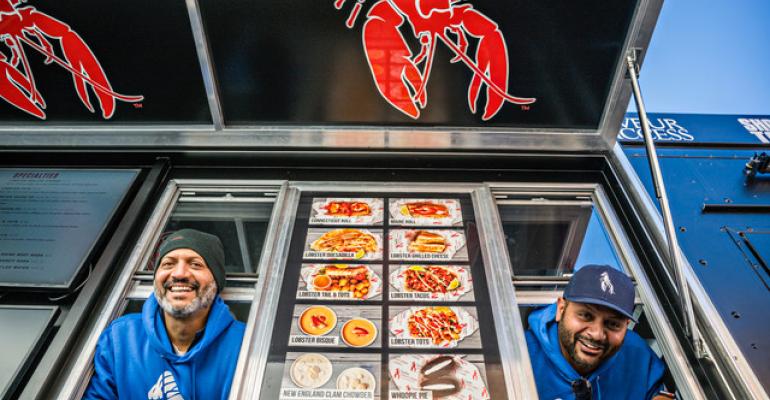If founders, chefs and other creatives are the beating heart of the restaurant industry, then franchisees are the veins delivering their ideas to all corners of the globe. Franchising is critical to the success of the industry, allowing brands to quickly scale their big ideas using other people’s capital. And whether it’s a mom-and-pop restaurant owner with one or two franchised restaurants or a seasoned veteran whose influence in the industry is well-known, franchisees — with all their individual attributes, styles and personalities — make a huge impact on the success of a business.
In this week’s installment of Franchisee Spotlight, we’re speaking with Raj Mohan — co-owner of three Cousins Maine Lobster food trucks in the San Francisco Bay Area — about the benefits and differences of being a mobile franchisee instead of a typical brick-and-mortar store owner.
Store breakdown:
Raj and Rahul Mohan own three food trucks in the San Francisco Bay Area and will be opening two new franchised brick and mortar stores soon: one in San Francisco and one in Denver.
How they got into franchising
“My background has mostly been in tech, and my brother’s background has mostly been in food, but never franchises. We thought that if we ever got into food, it would have to be a franchise because the industry is so hard. […] We had our eyes and ears open for something exciting that would come up.”
Their first Cousins Maine Lobster experience
“We always used to watch Shark Tank, and I remember seeing Cousins Maine Lobster on the show. Then, I was taking a trip to Dallas in 2019 and my daughter said that that truck from Shark Tank is going to be there, so we decided to check it out. It was Christmastime, so it was a bit nippy out, and we stood in line for about two hours to get those lobster rolls. During those two hours, we stood in line with a bunch of people who were talking about it how they loved it and did not mind standing in line for hours to get their food. So I reached out to see if Bay Area territory was available, and it was.”
Why the brand is a good fit
“Just look at the way their brand is set up on social media and their fan following. Secondly, all of their sustainability practices and being so involved with the Maine lobster industry, and to have fresh seafood at every location is just amazing.”
Why they chose a small franchisor
“The biggest difference we saw was how heavily these guys are involved. The cousins are involved in maintaining every little aspect of the business when they could have just spread their wings and opened a bunch of franchises. But they're very cautious about who they're opening these locations with: they’re very conscious of the supply chain that is involved. […] They’re also family-first, and once you join that family […] every franchisee does not treat us as competition – they welcome us with open arms […] It’s a close-knit family, and it trickles down from corporate to franchisees because they’re making a conscious effort to bring the right franchisees into the system.”
Why open mostly food trucks?
“The biggest thing about restaurants is the location and the food truck allows us to switch locations on the fly. If the customer is three blocks away, we’ll drive the truck three blocks away. Secondly, their primary business model is food trucks. We opened right in the middle of COVID and everything was closed except for food trucks because they were outdoors. We could park outside apartment buildings and serve people.”
Challenges of running a food truck
“One of the challenges is people like to go to the same location to work, and don't like the idea of having to switch locations two times a day. Another challenge was, from a maintenance perspective, most of the restaurant equipment out there is designed to be in a stable steady environment and the trucks have constant vibration and move over speed bumps. So, the maintenance of the trucks, is higher, and the restaurant equipment that's installed. Then on the back end, you’re always trying to find the right location. We have to scope out locations every morning; we can’t just open our doors.”
Business goals
“We want to grow organically by adding the restaurants in San Francisco and Denver, and we are in talks about other territories in the United States, or even outside the U.S., but we want to grow to as many trucks as we can.”





